- Home
- Conn Iggulden
The Gates of Athens Page 2
The Gates of Athens Read online
Page 2
Xanthippus grunted as his greaves were pressed into place. Moulded to the exact shape of his shin and knee, they needed no straps or thongs, but were held secure by the natural spring in the metal. They gleamed as if made of gold, shining with the same blessed oil that had been rubbed into his limbs.
‘Hold a moment,’ he said.
The men stood back and he dropped into a low lunge. The greaves remained in place and he nodded. As he rose again, one of the men reached around him to fasten a kilt of white linen. His thighs would remain uncovered. It was one thing to run or train naked in the heat of summer. Battle was different. Xanthippus had learned from his father how useful a bit of cloth can be, when sweat or blood is in your eyes.
Bare-chested, Xanthippus eyed his breastplate as it was raised up. The inner layer was of bleached linen, sewn thick and strong. Over that was a greater weight of bronze scales. He knew he would feel it every step he marched away from the city. Yet for all its heaviness and ridiculous expense, it was the skin of war. Some of the other strategoi preferred a solid plate of bronze or leather. Xanthippus disliked the feeling of restriction. He had seen a man who could not tie his sandals without removing his breastplate, helpless as a fish on land. In comparison, his scales made him feel invincible. As his greaves had been shaped to him, the breast-piece was the work of a master smith. Bronze was a warm metal when it touched his skin. Everything about it pleased him.
He nodded and muttered as the armour was fastened, with two straps over his shoulders and a cinch at his waist. Two smaller plates – the wings – hung down over his groin, protecting the great vein at the top of each leg. With his shield raised, an enemy would see only bronze greaves, round shield and helmet – a man of gold. The thought was good. His arms were left clear of all obstruction and he clenched his hands and swung them, loosening stiff shoulders and checking he had full movement.
His studded sandals were tied securely and he added a cloth headband above his eyes. It would soak up sweat and help cushion the weight of his helmet. Xanthippus felt his heart quicken as a second group of slaves brought in the weapons of a hoplite. These had not been bought for him by the wealth of the Alcmaeonidae, his wife’s family, who traced their line back to the adventures of Homer’s Iliad. No, they showed the years of use, in scratches and dents and even a small patch of brazed repair by the helmet nose-piece. Each part of his gear had saved his life at some point. Xanthippus looked upon the collection with pride and affection, as a man might pat the head of a favourite hound.
‘Where is my shield?’ he said.
The hoplon shield had not been carried in with the rest. The others looked to the most senior man there to answer. Manias bowed before replying, more serious than usual on such a day.
‘The mistress asked to be the one to show it to you.’
‘I see. Agariste has had it repainted.’
It was not exactly a question, but Manias dipped his head even so, flushing under the cold gaze of the master of the house. As slave to the Alcmaeonidae, Manias had served the household in various roles for every year of the mistress’s life. He was fiercely loyal to Agariste, as only one who had carried her on his shoulders when she had been a little girl could be. Yet that moment was one of silent communication between two men, regardless of their different stations.
Xanthippus said nothing more, though anger radiated from him, making the other slaves clumsy as he checked his spear for cracks along its length. There were none. On impulse, he waved them back and whirled the great weapon around his head and body, making it sing through the air. As long and half again as he was tall, the weight of the iron-leaf point was perfectly balanced by the bronze spike at the other end – the lizard killer, as young epheboi hoplites called it. The length of Macedonian ash felt good as he twisted it in his palms. He could feel the marks of tools in its planes, the memory and sweat of older craftsmen as they worked on it. He had killed men with that dory spear. It felt right to hold it.
Xanthippus ran a hand through the horsehair plume that formed the crest of his helmet. There was no dust and the massed bristles were neatly trimmed and new. Satisfied, he placed it at his feet and unsheathed his sword, checking the iron blade for imperfections. Some things could not be left to slaves, no matter how experienced. The sword had been well cared for since the last time he had drawn it on behalf of the city. It too shone with olive oil, unmarked by stubborn black spots of rust. Sheath and belt were buckled to his waist and he began to feel heavier, armoured.
Agariste came out of the shadowy cloister beyond the sunlit room. Slender as she was, she bore the weight of his shield, the heaviest part of his kit – and the most important. The bronze circle was covered in a white cloth. He thought he knew what image would be there even so.
‘Leave us,’ she said softly.
The slaves vanished into the gloom around them, skilled in their ability to follow her orders. This was her house, after all, her father’s before her. Her uncle Cleisthenes would have stood where Xanthippus did now, the man who had redesigned democracy in Athens, who had chosen the names of the ten tribes. Hers was a famous line. Xanthippus felt the weight of it at times. Yet he knew she loved him in all her unmarked youth, the green spring of her life. They had married when she was sixteen and he thirty, just embarking on his political life. Eight years had passed and if he had risen, it was in part due to the support of her family. Yet she had come to a grown man in her first bloom, and still feared his disapproval. A single angry word could bring tears to her eyes, he knew. It was written in every line of her as she approached, terrified Xanthippus would not like what she had done.
‘Show me, then,’ he said. He still held his spear in his right hand and reached out with the left, his fingers splayed.
Mute, with her lower lip held under her teeth, she pulled away the cloth, letting it flutter to the tiles.
He had expected some aspect of a lion the moment he’d heard she had repainted his shield. The dream had tormented Agariste for years, coming again and again to disturb her sleep. He’d heard every detail a dozen times. Yet it did not have the feel of prophecy, at least to his ear. Though he indulged her to keep the peace, Xanthippus thought the gods would not have trusted his foolish young wife with a true vision. He thought instead that it sprang from her worry for him, or for the children. He could not banish a pang of dread at losing the simple old eye on his shield, however. It had glared out at every enemy he’d ever faced, but now it was gone, made blind by her.
‘It is very fine,’ he said.
‘You like it? Truly?’ she said, looking into his eyes. ‘No. You don’t like it.’
‘It is beautiful,’ he said in perfect honesty. In truth, the artist was very skilled. The lion roared out of the centre of the shield, all head and teeth and rage. It was a fine image, though he would still have preferred the old unblinking eye to watch over him.
‘In the dream where I gave birth to a lion,’ she said, choosing to fill the silence with a stream of words, ‘I thought at first it had to be the baby. As I was full of child, what else could it be? But then I saw your shield and I thought… what if you were the lion? What if I could help to make my Xan the lion of Athens?’
‘I cannot say which is right, not today,’ he replied.
The conversation demanded more of him than he wanted to give in that moment. He needed to be still and grim and silent, with the tools of war in his hand and battle ahead. Yet she continued to draw him out, breaking the cold hardness in him. It was not always welcome.
There were no slaves in sight as he looked around, though he knew they would be within call.
‘Agariste… what will happen today…’
‘Oh! The children! I must bring them out to see you off.’
‘No, Aggie…’ but she had gone, vanished in a few steps, so that he stood alone in the beam of sunlight under the blue sky. The sun was rising and he was suddenly eager to go. He almost strode from that place, but he heard the voices of his children, the soun
d catching him like a briar.
Ariphron was the eldest at seven, the boy’s six-year-old sister Eleni approaching in his wake. They came in like little geese, looking with awe at the sight of their father gleaming oil and gold, like a living god. Agariste held the hand of the youngest, stumbling at her side. At five years old, his youngest son seemed close to tears.
Xanthippus laid down his spear and knelt.
‘Come to me, little ones. You too, Pericles. It’s all right. Come.’
The three of them ran to him, thumping their father in the chest and running their hands over the bronze with wide eyes.
‘Are you going to kill Persians?’ Ariphron asked.
Xanthippus looked over to his eldest son and nodded.
‘Many Persians, yes. Hundreds.’
‘Will they come here to kill us?’
‘Never. Every man in Athens is arming himself to face them. They will regret ever coming here.’
To his irritation, his daughter Eleni suddenly started to weep, a process that began with her face crumpling and continued with the issuing-forth of wails and sobbing of extraordinary volume. Xanthippus winced and regretted that he had allowed the moment at all.
‘Perhaps you could take your sister and brother to the kitchens, Ariphron. Find them some fruit, or whatever the cook has on the spit. Would you like that?’
His oldest son nodded solemnly, understanding that he was being trusted with a task of responsibility. Xanthippus could not prevent another embrace, but then the children were gone, Ariphron leading the others.
Agariste reached down to pick up the spear. It looked strange in her hand and Xanthippus took it quickly. There had been too many strange omens that day already – weeping children being the last of them. He had lost the eye on his shield and he did not want her to drop his weapon, for fear of what that might mean. His hand closed over hers and he could feel the warmth of her and smell the perfume she used, a paste of rose and lavender and musk. It filled his nostrils and he wondered if he smelled the sweet oils of his own funeral pyre.
‘Agariste, if we lose…’
‘Don’t say it, Xan. You will invite the disaster. Please.’
‘It has to be said. I have to know you understand.’
‘Please…’
He thought she might turn and run from him. In reply, he felt anger surge. In some ways, she was still an innocent. He gripped her wrist, hard enough to make her cry out.
‘If we lose and they come here, you must kill the children.’
‘I can’t do that,’ she whispered.
She would not look at him and twisted almost unthinkingly, trying to remove his grip. He held her even tighter and he did not relent, though tears ran down her cheek.
‘You are the mistress of the house, Agariste. You will do that. If you cannot wield the blade yourself, give it to Manias. Do I need to tell you what Persians do to children they capture? Will you force me to describe the horror of it? They are a plague in the world, Agariste. I have seen the results of their… attentions. I have seen the corpses. If we lose, they will make an example of Athens. The city will die and there will be no safe place. It is not like the battles of before, when an army of Sparta came to stand beneath the Acropolis, or the horsemen of Thessaly fought against us. We are Greeks and we know the limits of war – and when there are none. The Persians… they are too cruel, my love. And they are many, like grains of sand. If they win, you must save the children and yourself from what will come.’
‘If it is your command, husband, I will do as you say.’
She bowed her head, though when she met his gaze, he realised he was not certain she told the truth. Her family had been wealthy and powerful for centuries. It gave them a sense of confidence, not least in their ability to survive. He could see that in her. He could only pray – to Ares, to Zeus, to Hera the goddess of marriage – that Agariste would be spared, that she would never have to discover how fragile the world truly was.
He kissed her then, without passion, but as a farewell and a promise.
‘If I can, I will come home,’ he said.
He did not tell her how small a chance he judged it to be. Those Greeks who thought they could win the battle had never seen the armies of Persia. They had been like black locusts in Ionia – and that was said to be just one small part of the whole. Xanthippus had fought then against their garrisons, supporting Greeks who merely wished to live free. He had witnessed Persian vengeance, carried out on innocents. It was rare for him to sleep without some picture from that time coming back to throw him out of slumber. His wife’s doctor had told him the dreams would fade in a few more years, but it seemed he would not be given the time he needed. He had to go to war on Greek soil, a man who had watched Sardis burn.
Xanthippus took up his helmet and pushed it hard onto his head. His hair had been drawn into a knot that served to cushion him from a blow. The lining was old enough for him to recognise the smell of sweat and rancid oil the moment he shoved it down. His view was a crosspiece, like a sword hilt. It brought back memories of all the other times he had worn it and he felt his mood darken. Reverently, he took up his spear and shield, testing the grips for strength. There would be blood sacrifices made on the gathering field by the Academy. As a senior man of the Assembly, he could easily be chosen to slaughter a ram to the gods for their good fortune. He would certainly be called upon to kill men.
‘You will come home,’ Agariste said, suddenly. ‘In glory, with your lion shield. I see it, Xan. I see it now.’
He could not kiss her while he wore the helmet, but she embraced him once more, clinging to his armour. He saw the slaves and staff had gathered. Some fifty of them had abandoned their work to see the master leave for war. Cooks and elderly gardeners knelt as he passed. Horse boys stared at the man in golden bronze who would fight for them and for the city.
Out beyond the walls, in the sun, the road was surprisingly quiet. Xanthippus had expected crowds of refugees trying to get out. It seemed the people of the city understood what his wife would not. There was nowhere to run. The Persians had landed. If they were not thrown back into the sea, it was the end.
Xanthippus murmured thanks to his groom for bringing his horse. He nodded to the two who would run alongside him out to the gathering ground. Both Xenias and Theos were free men, though they had earned that freedom in trade and skill. They too wore serious expressions and he had a sense of falseness, of wrongness. On the one hand, his wife and her slaves stood to see him off. The children had crept out, of course, clambering up to peer over the wall at him like little owls. Xanthippus nodded to Ariphron. It might almost have been a normal day.
On the other hand, a dark gulf yawned before him. Xanthippus could already sense the silence to come, just moments off. He and his two seconds would leave the estate behind and go to a place where the whole army was gathering, to destroy or be destroyed.
He had to go, to leave his family behind. The fear and seriousness of it lay heavier than armour. He passed his shield and spear to his seconds and mounted his horse, taking up the reins. Xenias and Theos fell in beside him, shining with oil and early sweat. As Xanthippus turned his back on all he loved, the high voices of his children called after him, dwindling with every step. He did not look back.
2
The Academy had been created as a gymnasium for the young warriors of the city. When it had first been laid out, around a sacred grove of twelve olive trees, it had been a place of great beauty, with statues and a running track alongside the river banks. Over a hundred years, it had been poorly maintained, with the track now more moss and crabgrass than ashes and fine stones. Without proper care, the groves and walkways had returned to clay and patches of weeds. It was a symbol of hopelessness and Xanthippus glowered as he rode through to the gathering ground. His two seconds loped along with him, taking their mood from his.
Beyond the Academy, Xanthippus took some heart from the massed ranks assembling. Only the gods or the Spartans could have
moved faster to war than his people. Though it was barely noon, Xanthippus could see banners from all ten tribes of the city. He found his tribe of Acamantis easily enough. He could have named many of the thousand men he would command, certainly those from his home deme of Cholargos. There were just a hundred of those and each one knew Xanthippus well.
He greeted them with clasped arms as he passed along the line, stopping to exchange words with the smaller number he called friends. Each of them was similarly garbed in helmet, breastplate and greaves. With sword, spear and shield, the cost of the entire kit represented anything up to a year’s wage. Most had been inherited, or won on the field of battle.
‘There he is!’ said a voice Xanthippus knew.
The one who spoke had been present in Ionia for the Sardis campaign. Epikleos was a wealthy man in his own right, though his family had made most of their fortune trading oil and figs rather than from the spoils of war. One of four brothers, Epikleos had drawn the short straw, as he described it, forced to train as a soldier from a young age rather than something more worthwhile, like politics or writing poetry. In truth, Epikleos was as skilful at the Pyrrhic dance as any warrior Xanthippus had ever met. He had not been made for a merchant life, nor counting beats in a line of verse. Sparring with him had almost certainly saved Xanthippus’ life, more than once.
‘I like the shield,’ Epikleos said. ‘A lion is better than that old dead eye of yours. Agariste, was it?’
Xanthippus found himself flushing.
‘Yes. She dreamed of a lion.’ He preferred to change the subject. ‘What news here?’
His friend was still oiling himself and stretching muscles. Epikleos wore a bronze breastplate, accepting the penalty in weight for the gleam of a thing that made him look like a young Heracles. Or because it made the younger warriors look at him, Xanthippus thought. Epikleos could be astonishingly vain. He had once carried Xanthippus’ spear, a boy following his hero in bronze. It was a strange thing to see fine lines around his eyes.

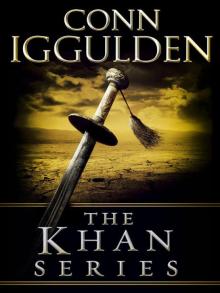 The Khan Series 5-Book Bundle
The Khan Series 5-Book Bundle Tollins 2: Dynamite Tales
Tollins 2: Dynamite Tales Tollins: Explosive Tales for Children
Tollins: Explosive Tales for Children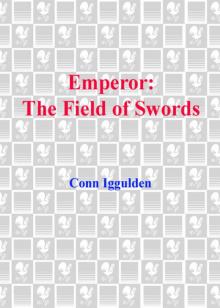 The Field of Swords
The Field of Swords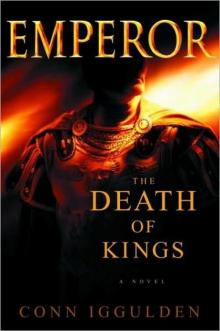 The Death of Kings
The Death of Kings Quantum of Tweed: The Man With the Nissan Micra
Quantum of Tweed: The Man With the Nissan Micra Bones of the Hills
Bones of the Hills Genghis: Birth of an Empire
Genghis: Birth of an Empire The Gates of Rome
The Gates of Rome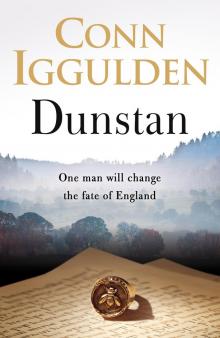 Dunstan
Dunstan Fig Tree
Fig Tree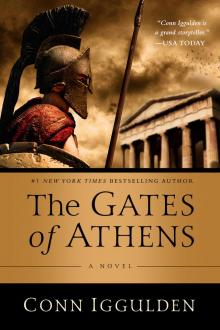 The Gates of Athens
The Gates of Athens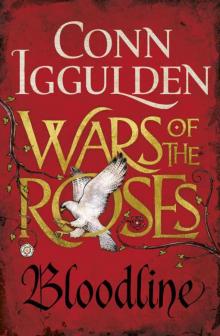 Stormbird
Stormbird Khan: Empire of Silver
Khan: Empire of Silver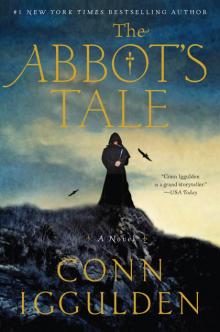 The Abbot's Tale
The Abbot's Tale Gengis: Lords of the Bow
Gengis: Lords of the Bow The Gods of War
The Gods of War Blackwater
Blackwater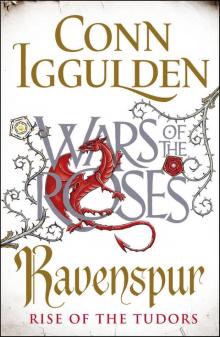 Ravenspur: Rise of the Tudors
Ravenspur: Rise of the Tudors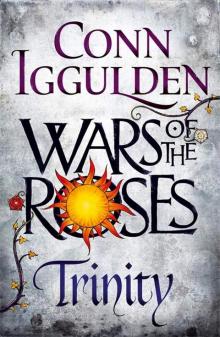 Wars of the Roses: Trinity (War of the Roses Book 2)
Wars of the Roses: Trinity (War of the Roses Book 2) The Gods of war e-4
The Gods of war e-4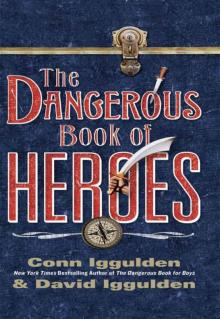 The Dangerous Book of Heroes
The Dangerous Book of Heroes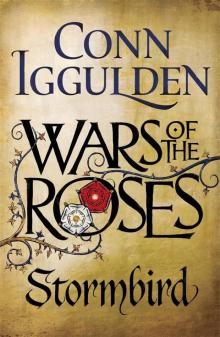 Stormbird wotr-1
Stormbird wotr-1 Emperor: The Death of Kings
Emperor: The Death of Kings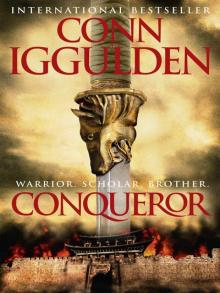 Conqueror (2011) c-5
Conqueror (2011) c-5 The Dangerous Book for Boys
The Dangerous Book for Boys Genghis Lords of the Bow
Genghis Lords of the Bow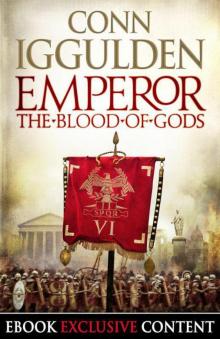 Emperor: The Blood of Gods (Special Edition) (Emperor Series, Book 5)
Emperor: The Blood of Gods (Special Edition) (Emperor Series, Book 5) The Emperor Series: Books 1-5
The Emperor Series: Books 1-5 Lords of the Bow c-2
Lords of the Bow c-2 Lords of the Bow
Lords of the Bow Quantum of Tweed
Quantum of Tweed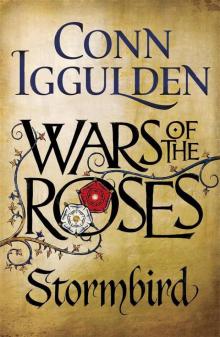 Wars of the Roses 01 - Stormbird
Wars of the Roses 01 - Stormbird Empire of Silver c-4
Empire of Silver c-4 Birth of an Empire
Birth of an Empire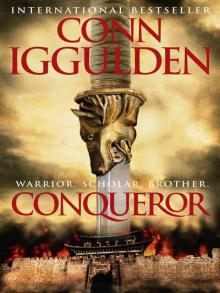 Conqueror (2011)
Conqueror (2011)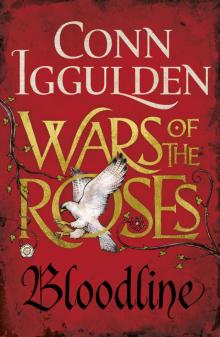 Wars of the Roses: Bloodline: Book 3 (The Wars of the Roses)
Wars of the Roses: Bloodline: Book 3 (The Wars of the Roses) Bones Of the Hills c-3
Bones Of the Hills c-3 Empire of Silver
Empire of Silver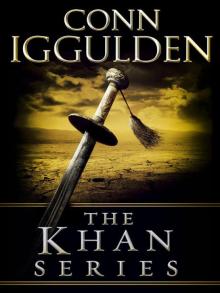 The Khan Series 5-Book Bundle: Genghis: Birth of an Empire, Genghis: Bones of the Hills, Genghis: Lords of the Bow, Khan: Empire of Silver, Conqueror
The Khan Series 5-Book Bundle: Genghis: Birth of an Empire, Genghis: Bones of the Hills, Genghis: Lords of the Bow, Khan: Empire of Silver, Conqueror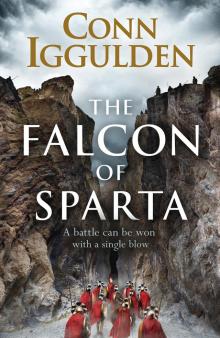 The Falcon of Sparta
The Falcon of Sparta Explosive Tales for Children
Explosive Tales for Children